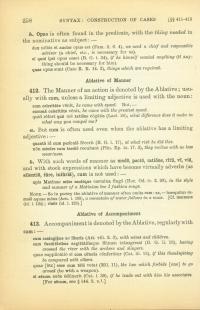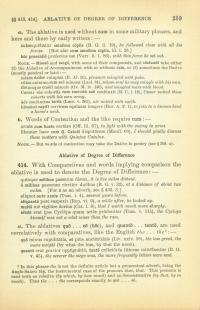413. Accompaniment is denoted by the ablative, regularly with cum.
cum coniugibus ac līberīs (Att. 8.2.3)
with wives and children
cum funditōribus sagittāriīsque flūmen trānsgressī (B. G. 2.19)
having crossed the river with the archers and slingers
quae supplicātiō sī cum cēterīs cōnferātur (Cat. 3.15)
if this thanksgiving be compared with others
quae [lēx] esse cum tēlō vetat (Mil. 11)
the law which forbids [one] to go armed
(be with a weapon)
sī sēcum suōs ēdūxerit (Cat. 1.30)
if he leads out with him his associates
For sēcum, see § 144.b, Note 1
a. The ablative is used without cum in some military phrases, and here and there by early writers.
Subsequēbātur omnibus cōpiīs. (B. G. 2.19)
He followed close with all his forces.
But also cum omnibus cōpiīs (id. 1.26)
Hōc praesidiō profectus est. (Verr. 2.1.86)
With this force he set out.
Note— Misceō and iungō, with some of their compounds, and cōnfundō take either (1) the Ablative of Accompaniment with or without cum, or (2) sometimes the dative (mostly poetical or late).
mixta dolōre voluptās (B. Al. 56)
pleasure mingled with pain
cûius animum cum suō misceat (Lael. 81)
whose soul he may mingle with his own
flētumque cruōrī miscuit (Ov. M. 4.140)
and mingled tears with blood
Caesar eās cohortīs cum exercitū suō coniūnxit. (B. C. 1.18)
Cæsar united those cohorts with his own army.
āēr coniūnctus terrīs (Lucr. 5.562)
air united with earth.
hūmānō capitī cervīcem equīnam iungere (Hor. A. P. 1)
to join to a human head a horse's neck
b. Words of contention and the like require cum.
armīs cum hoste certāre (Off. 3.87)
to fight with the enemy in arms
Libenter haec cum Q. Catulō disputārem. (Manil. 66)
I should gladly discuss these matters with Quintus Catulus.
Note— But words of contention may take the dative in poetry (see § 368.a)


